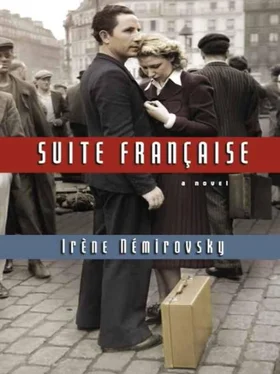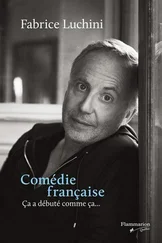Madame Bracelet, farmer's wife in Les Roaches, two sausages, a pot of honey, a jar of potted meat… Madame Joseph, from the Rouet estate, two potted guinea fowl, some salted butter, chocolate, coffee, sugar…
"I can count on you, can't I, ladies?" the Viscountess said again.
But the farmers' wives just stared at her, astonished: they never went back on their word. They said goodbye to the Viscountess, holding out their red hands that were chafed by the harsh winter, by caring for animals, by doing the washing. She shook each hand reluctantly; touching them was physically distasteful to her. But she made the effort to overcome this feeling so contrary to Christian charity and, in the spirit of mortification, forced herself to kiss the children who accompanied their mothers; they were all fat and pink, overfed and with dirty faces, like little pigs.
At last the room was empty. The teacher had taken the girls out; the farmers' wives were gone. The Viscountess sighed, not from tiredness but from disgust. How base and ugly people were! "You have to go to so much trouble to instil a glimmer of love into these sad souls…" she said to herself out loud, but as her spiritual adviser had suggested, she offered up her day's tiredness and work to God.
"And what do the French think, Monsieur, of the outcome of the war?" Bonnet asked.
The women looked at each other, scandalised. It just wasn't done. You simply didn't talk to a German about the war-not about this one, or the other one, or about Maréchal Pétain, or about Mers-el-Kébir, or about how France had been split in two, or about the occupying forces, or about anything that mattered.
There was only one possible attitude: an affectation of cold indifference, the tone of voice Benoît used as he raised his glass, full to the brim with red wine: "They don't give a damn, Monsieur."
It was evening. The setting sun, clear and crisp, was a sign there would be a frost that night, but that the next day would undoubtedly be magnificent. Bonnet had spent all day in the village and was on his way to bed. But before going up, he had lingered downstairs-out of politeness, natural kindness, the desire to be well regarded or perhaps simply the wish to warm himself a moment by the fire. Dinner was almost over; Benoît was alone at the table; the women had already got up and were tidying the room, doing the dishes.
The German looked at the big useless bed with curiosity. "No one sleeps here, do they? It isn't used for anything? How odd."
"Sometimes it's used," said Madeleine, thinking of Jean-Marie.
She thought no one would guess, but Benoît frowned; every allusion to what had happened that past summer pierced straight through his heart like an arrow, but it was his business, no one else's. He looked reproachfully at Cécile, who had started to snigger.
"Sometimes it can be useful," he replied with excessive politeness. "You never know… If something bad happened to you, for example (not that I'd want it to). Around here, we lay out our dead on beds like this."
Bonnet looked at him, amused, with the same scornful pity you feel when a wild animal grinds its teeth behind the bars of its cage. "Fortunately," he thought, "this man will be busy working and won't be around too often… and the women are more approachable." He smiled. "In wartime, none of us wants to die in a bed."
Madeleine, meanwhile, had gone out into the garden; she came back with some flowers to decorate the mantelpiece. They were the first lilacs of the season, as white as snow, with greenish tips. At the top of each stem the clusters of flowers were still in bud, but further down they opened out into perfumed blooms.
Bonnet lowered his pale face deep inside the bouquet. "How divine… and how well you know how to arrange flowers."
For a second they stood silently, side by side. Benoît thought that she (his wife, his Madeleine) always seemed comfortable when it came to doing lady's work-when she chose flowers, polished her nails, wore her hair differently from the other women in the area, when she spoke to strangers, held a book… "People shouldn't take in foster-children, you never know where they come from," he said to himself. Once more that painful thought… When he said, "You don't know where they come from," what he imagined, what he was afraid of, wasn't that Madeleine might come from a family of alcoholics or thieves, but from the middle classes; perhaps it was that which made her sigh and say, "Oh, it's so boring in the countryside," or "I want to have pretty things, I do," and it was that which made her feel some vague bond with strangers, with the enemy, so long as he happened to be a gentleman with fine clothes and clean hands.
He pushed his chair back angrily and went outside. It was time to get the animals in. He stayed in the warm darkness of the stables for a long time. A cow had given birth the day before. She tenderly licked her little calf with its big head, its thin trembling legs. Another cow was breathing quietly in the corner. He listened to her calm, deep breaths. From where he was, he could see the open door of the house; a shape appeared on the doorstep. Someone was worried because he hadn't come back, they were looking for him. His mother or Madeleine? His mother, no doubt… Just his mother, sadly… He wouldn't move from here until the German had gone upstairs. He'd see his light go on. Sure, electricity didn't cost him anything. He was right; after a few moments a light shone through the window. At the same time the shadowy figure who'd been looking for him left the doorstep and ran lightly towards him. He felt his heart soften, as if some invisible hand had suddenly lifted the burden that had weighed so heavily on his chest for so long that he felt crushed by it.
"That you, Benoît?"
"Yes, I'm over here."
"What are you doing? I was scared."
"Scared? Of what? You're crazy."
"I don't know. Come in."
"Wait. Wait a little."
He pulled her towards him. She struggled and pretended to laugh, but he could sense, by a kind of stiffening throughout her body, that she didn't really want to laugh, that she didn't find it funny, that she didn't like being thrown down in the hay and cool straw, she didn't like it… No! She didn't like him… She got no pleasure from him.
He said very quietly, in a low voice, "Is there nothing you like?"
"There is… But not here, not like this, Benoît. I'm embarrassed."
"Why? You think the cows might see you?" he said harshly. "Fine, go on, get out."
She let out the despondent little moan that made him want to cry and kill her at the same time.
"The way you talk to me! Sometimes, I think you're cross with me. For what? It's Cécile who's…"
He put his hand over her mouth; she quickly pulled away and continued, "She's the one who's getting you all worked up."
"No one's getting me worked up. I don't need other people's eyes to see, do I? All I know is whenever I come near you it's always 'Wait. Not now. Not tonight, the baby's worn me out.' Who are you waiting for?" he roared suddenly. "Who are you saving yourself for? Well? Well?"
"Let go of me!" she cried as he grabbed hold of her. "Let go of me! You're hurting me."
He pushed her away so violently that she hit her head on the low door frame. They looked at each other for a moment in silence. He picked up a rake and angrily stabbed at the hay.
"You're wrong," Madeleine said finally, then whispered tenderly, "Benoît… Poor dear Benoît… You're wrong to think such things. Come on, I'm your wife; if I seem cold, sometimes, it's because the baby wears me out. That's all."
"Let's get out of here," he said suddenly. "Let's go up to bed."
They went into the dark empty house. There was a little light left in the sky and at the tops of the trees. Everything else-the earth, the house, the meadows-was plunged into cool darkness. They undressed and got into bed. That night he didn't try to take her. They lay awake, motionless, listening to the German's breathing above their heads, the creaking of his bed. In the darkness, Madeleine reached for her husband's hand and squeezed it tightly. "Benoît!"
Читать дальше

![Константин Бальмонт - Константин Бальмонт и поэзия французского языка/Konstantin Balmont et la poésie de langue française [билингва ru-fr]](/books/60875/konstantin-balmont-konstantin-balmont-i-poeziya-francuzskogo-yazyka-konstantin-balmont-et-thumb.webp)










